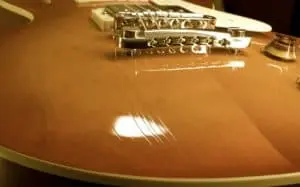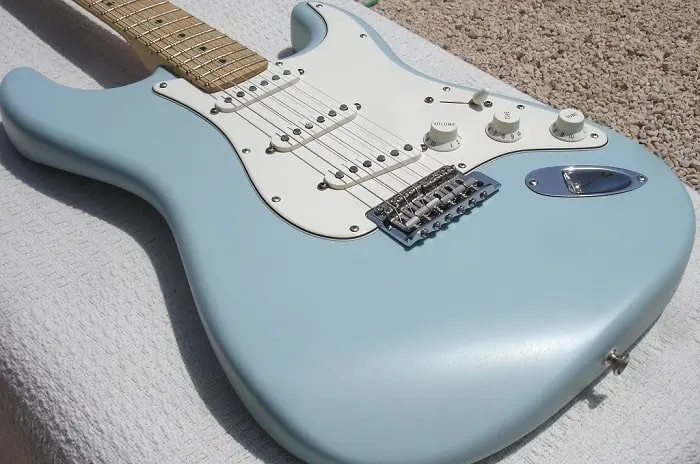 The guitar world is probably among the very top communities when it comes to egos. There are so many warring camps that just can’t stand the other party.
The guitar world is probably among the very top communities when it comes to egos. There are so many warring camps that just can’t stand the other party.
Whether its the Stratocaster versus Les Paul, active pickups versus passive ones, this distortion over that one. There’s all kinds of rivalries.
One of the most intriguing ones has got to be the nitrocellulose finish versus polyurethane finish. There are a lot of heated discussions going on about this issue, and you will find a lot of purists who insist that nitrocellulose is the only true way to go.
The question is how true is this claim? Is a nitrocellulose lacquer guitar really going to sound better than the one that has a polyurethane finish? In order to answer this question we need to go back in time and see how this technique came to be.
Overview
Nitrocellulose Lacquer was first developed sometimes in the ’20s and it was the only way to treat guitars for decades to come. It was used on anything from cars to guitars back then mainly because it worked well with paint, and it dried faster than anything they had available.
However nitro was not easy to produce nor work with. To get nitrocellulose, you have to take resin and combine it with sulfuric and nitric acids. This process is called nitration. Some other things are made this way too, like explosives.
You probably see where this is going. [su_highlight background=”#fe160d”]Nitro is very flammable[/su_highlight], and somewhat unstable, which means that producing it and applying it to guitars is not an easy thing to do.
 It smells great and also ages very gracefully, but how does it impact sound? Is Nitrocellulose Lacquer finish really adding to the quality of your guitar’s tone? The reason why so many purists insist that nitro offers superior sound qualities compared to poly finished guitars doesn’t have much to do with the material itself. It has a lot more to do with the thickness of the finish.
It smells great and also ages very gracefully, but how does it impact sound? Is Nitrocellulose Lacquer finish really adding to the quality of your guitar’s tone? The reason why so many purists insist that nitro offers superior sound qualities compared to poly finished guitars doesn’t have much to do with the material itself. It has a lot more to do with the thickness of the finish.
Which One is Better?
The thickness of the finis can impact the sound your guitar will make. If you apply a thicker coating of anything to the body of a guitar, whether it’s nitro or poly coating, you will reduce the resonance properties of the wood.
It’s simple as that. Nitro finish is traditionally very thin, which allows the wood to “work” the way it wants to. On the other hand poly finish is much thicker in most cases, which leads to it constraining the wood of the guitar, and thus limiting its resonance.
If you took the poly finish and applied it in the same thickness as nitro is usually applied, you would have a very similar result in terms of sound. People associate poly finish with reduced resonance because the companies who treat their guitar with this material usually don’t care too much about how it affects sound.
We are, of course talking about low to mid level instruments here. You can’t go and mass produce guitars if you are going to use nitrocellulose on them. It would take too much time and way too many man hours to do the job properly.
This increase in manufacturing efforts also increases the cost of the instrument, and it would be somewhat counter intuitive to do so if the hardware or the tonewood don’t justify the additional price. And they wouldn’t in most cases.
 So the main issue between these two types of finishes is how you apply them. Most of those who want to build their own guitar will be hell bent on using nitrocellulose as their finish of choice.
So the main issue between these two types of finishes is how you apply them. Most of those who want to build their own guitar will be hell bent on using nitrocellulose as their finish of choice.
However it’s both dangerous and in some places even straight illegal. There are rules that you have to follow when you’re handling this type of chemicals, and honestly not everybody should even try. Polyurethane finish, while not as elegant as nitro, is almost always the easier and better way to go.
Considering all this…
We went into a very touchy subject today, and surely there will be those who will disagree with us on this. The thing to remember is that in this day and age, there are far more important elements of a guitar that are worth spending additional money on than the type of finish you get.
With that said, purists will be purists and that is fine too.

O have looked and looked for polish for my 1954 Virginia Eric Johnson Stratocaster. It has a few light scratches. In the info it says use a non silicone base wax. I have looked on line and all I find is a bunch of people who thing that the knowledge they have just has to be said with no real answer. Can you please give me a straight answer. Thank you Patrick
Hi Patrick! Good question, silicone won’t harm a nitro lacquer (the finish used for the 1954 Virginia EJ strat), but it WILL make refinishing the guitar extremely difficult. Nitro lacquer won’t stick to a surface that has any silicone on it, but as long as you don’t plan on refinishing you should be fine.
This forum has a discussion on different waxes used on nitro lacquer